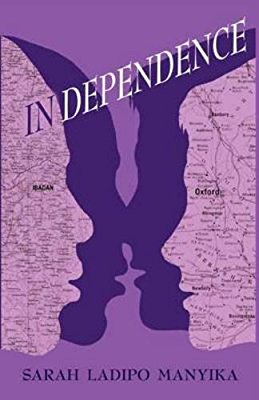Title of Book: In Dependence
Author: Sarah Ladipo Manyika
Genre: Novel
Category: Fiction

Author: Sarah Ladipo Manyika
Author’s Bio: Sarah Ladipo Manyika was raised in Nigeria and has lived in Kenya, France, and England. She holds a Ph.D. from the University of California, Berkeley, and teaches literature at San Francisco State University. Her writing includes essays, academic papers, book reviews and short stories. Sarah’s first novel, In Dependence, is published by Legend Press and Cassava Republic Press. Sarah is a book juror for the Etisalat Prize for Literature and for the California Book Awards. She sits on the boards of Hedgebrook and The Museum of the African Diaspora.In Dependence is a story about self-discovery, post-colonial era, family ties, the intricacies of different continents, races and the universally relatable theme of love woven around two interesting characters (Tayo and Vanessa).

Image credit: Amazon
This debut book consists of three parts: I (1963 – 1969), II (1970 – 1994), III & IV (1998), and it there will be a lingering fragrance in your mind long after you’ve finished reading. I read it for the first time early this year, then few weeks ago, I decided to read it again – at an enjoyable pace this time. It had me turning all 162 pages (okay, 169, if you include glossary, Oxford Terms and French delicacies). This book made me smile, ‘oooh,’ ‘awww,’ and ‘aaah’. And, I did have a good laugh when Tayo narrated his experience with the ‘Oxford Professor of Economics’ (page 93.). Then on completion, I suffered from a serious case of book withdrawal. LOL!
I particularly like the fact that it isn’t your conventional ‘happily ever after’ love story. It has a bitter leaf twist to it (haha! I just had to use bitter leaf for you to imagine how bitter the twist is) – fiction in a realistic point of view. The characters and their lives felt real to me; I was pulled in, and could connect with them on an emotional level. For instance, I could feel Tayo’s grief and the guilt he felt when he learnt of Christine’s suicide. Which made me ponder on the fact that depression is real – although seldom talked about in Africa – and it’s crucial that we don’t dismiss the signs in someone as plain craziness, spiritual problem or the ‘effect of watching too many American movies.’ Societal expectations, anxiety, pressure and loneliness can drive people to extremities. Be kind, understanding, show genuine care and love.
“And I suppose that this Lonely Londoners will tell me why I shouldn’t look at English girls?”
‘. . . I just thought I could talk to you as a friend.” “I feel scared,” she said. “I’m scared about my next tutorial, I’m scared about exams, I’m scared about what my parents will think if I don’t do well.”
“Christine, you are doing just fine. You’ll do fine in all of those things, and you’ve always done so well.”
“But that’s the point Tayo, I’ve always done well, which means that everyone now expects me to continue doing well, but what if I don’t?”
“You will.”
“But I won’t,” she said, shaking her head. “It’s just luck, Tayo, and everyone else is so much brighter than I am. It’s only because I study so hard……” (page 20 – 21)
“She had told him many times that she felt caught between two lands, never full belonging to England or Nigeria, but he has never taken it seriously, always thinking she was the strong and privileged one. But now he could we it clearly – the peripatetic lifestyle contributing to her anxieties at Oxford and amplifying her desire to please her family with academic success. But the taking of her life? How could she have done this? Why hasn’t she talked to someone? And why, how, had they all failed to realise the depth od her despair?” (Page 29.) This is relatable – the thoughts of those left behind after someone has committed suicide.
Also, throughout the book, I could sense a part of the author and I like how one is treated to glimpses of the uniqueness of African culture (mostly that of Nigeria) and the English way of life.
Example of that of Africa, is the significance of names as seen in this quotation:
“How about I give you a new name?”
“A what? Why?”
“Something to capture your fighting spirit. How about Moremi?”
“It means as tough as a nut. A little Cassius Clay. Legend has it that Moremi saved the Yoruba kingdom.”
Then there’s the funny reminder that in Africa, being skinny/slender as a lady, is perceived as unattractive. (Ugh. Tell me about it.) Quotation: “He replied that his mother was slender and that she routinely wrapped towels around her waist to make herself look bigger, which made Vanessa laugh. Skinny, he had to explain, was not considered beautiful. . .” True! Tayo’s letter to his father on Page 5 gives us insights into the English life: “The people can be a little strange too, and on the whole, not terribly friendly. . .their true temperament is somewhat cold, much like their weather. . .in this country, people do not greet each other in passing. . . some spot long hair, and bathing is not a daily occurrence on accoubt of the cold.”
Crucial topics such as: marriage, religion, racism, parenting, western influence in Africa even after independence, politics, family, ageing, romance, stereotypes, depression, are touched on – mildly for some, and heavily for others – in this awesome book.
I got an insight into life in the early post-colonial Nigerian era (1960, ’63, etc); students and civil servants riots, political instability, societal unrest, corruption, new movements here and there, change of government, amongst others (just like in Chimamanda’s Half of a Yellow Sun). Take this quotation from page 107 as an example:
“All across the nation, heavy glass frames were taken down from the walls and pictures of the President were updated. Out came the man in white civilian robes, and back went the green military fatigues . . . The routine was well-known by now, and would grow all too dismally familiar for Nigeria in the years to come, but at first, people celebrated the return of a strong military that promised to stamp out corruption. At that time anything promised to be an improvement on the nation’s failed experiment with democracy. However, soon the optimism vanished and university students took to to the streets in protest. Months turned into a year and, with each successive wave of discontent, students demonstrated, campuses were closed, people were arrested and some died during the protests.” This prompts one to ask: “what has changed from then till now?” I mean, here’s another quotation on this same issue from page 93: “This business of corruption is so bad. When I travel these days, I’m embarrassed to show my passport.” (Tayo)
On page 72 – 73, I was like “ohhh… so this is what the title ‘ ‘In Dependence’ is all about?” Lol. It began to add up, sadly, but yes. Sadly, because it marks the point at which the rift between Tayo and Vanessa materialised, on account of her father’s racism and his inability to make the right decision and stand up for what he believed in, but then, are some things just beyond our control? Vanessa’s independent nature was seen as “impetuous.” Perhaps, if the Miriam character hadn’t gotten pregnant later on, the relationship could have worked out. *Sigh* Love matters sha.
Quotations: “Vanessa, we can’t be together when your father is so opposed.”
“Well who cares what he says?. . . All that matters is that we love each other.”
“But relationships are also about family, Vanessa.”
“And I would sacrifice my family for you, Tayo.”
“You know I wouldn’t let you do that. We must respect your father. You are young and Nigeria is not a calm place these days. Perhaps it’s God’s will.”
“So now you think I’m too young? You think I don’t know what I want ?”
“Not too young Vanessa, but just too independent sometimes. . .”
“Too independent? It’s you, Tayo, who needs to learn some independence. You won’t confront these things, will you? You register something, block it out of your mind, and never deal with it. My father is racist. It’s simple. Don’t to see that?” Personally, I think the independent mentality is quite lacking in Nigeria and some other Third World Countries – we’ve gained ‘independence,’ but we are still ‘in dependence’ economically, socially, etc which shouldn’t be.
Page 88 does justice to this thought: “He didn’t like it when Nigerians shunned local products preferring to import all manner of things like Quaker oats and golden syrup bearing the royal stamp of approval: By Appointment to Her Majesty the Queen.” You can’t miss the sarcasm at the hypocrisy of it all.
From this book, I learnt that expatriates (and people generally) observe and use how we, as Nigerians relate with, and perceive one another, as a basis to come up with stereotypes. “Now there’s a bright fellow for you, with good manners, reading PPE at Balliol, and he’s Yoruba of course. They’ve always been the most straightforward. With the Hausa you can never tell what they are up to, and the Igbos are always so sly.” (Page 44, Mr. Richardson).
Okay, I could go on and on about this book – to show you how much of a great read it is – but, let me wrap it up. I commend the writer for all the extensive research put into this book, and let me just say that from the last pages (161 – 162), it is safe for one to conclude that though our expectations in romantic relationships may not turn out the way we expect, love – true love – will always find a way. If not now, then later in life.
“Sometimes I wish I could just go back in time and re-live them. I would make different choices now.”
“And what you you change?”
“I would have married you.”
“As an old man, I reaise what I’ve missed.” A letter lay on top of a book. She read the letter first. I am writing to inform you that I have serious intentions with Vanessa…” “. . .It’s a letter to my uncle and…well, I just wanted you to know that I was serious and that I had wanted to marry you.” Tears came to her eyes as she read more.
Note: the things we do and, the things we don’t do, are equally damaging.
Recommendation: I would recommend ‘In Dependence’ to anyone; those seeking to understand the things we don’t question enough (e.g religion, racism), people who don’t shy away from a good read, writers (Tayo’s literary achievement in his middle-age is every writer’s dream!), old, young, and those who have known what it means to love and perhaps, lost too . In all, it’ll definitely be worth every minute and money spent. (You’ll say I told you so!)
Rating: 9/10
Would you like to read In Dependence? Or have you read it already? Leave a comment, be excited to know your thoughts.

